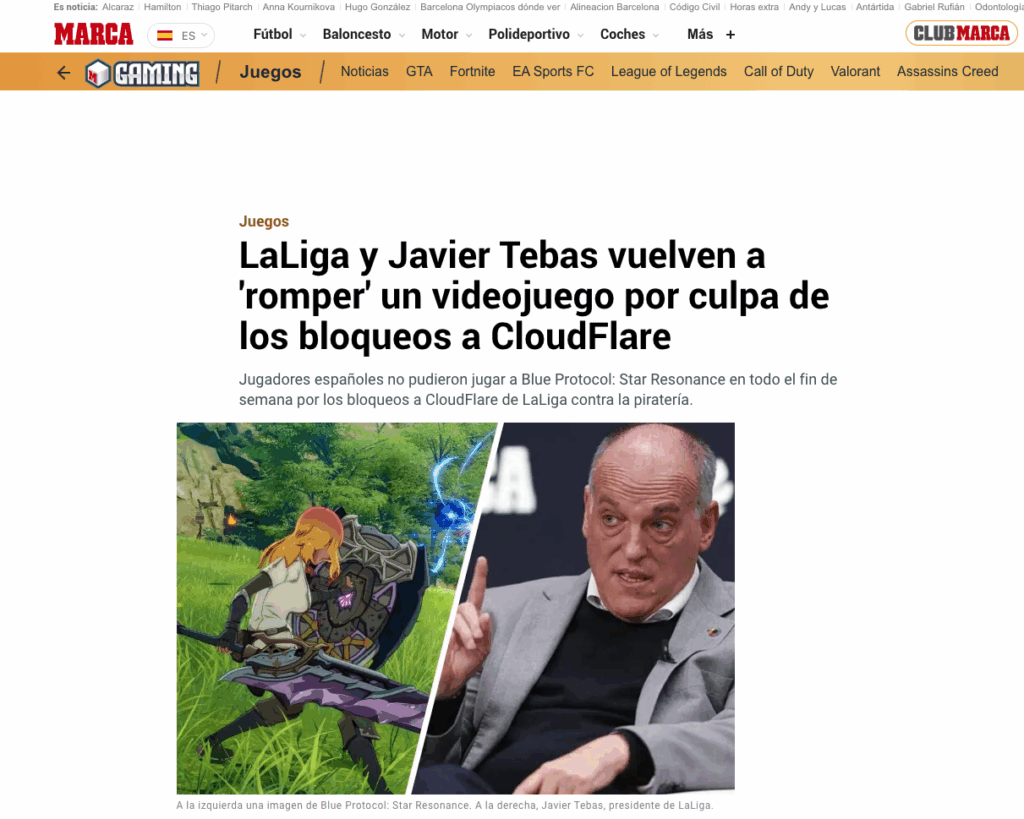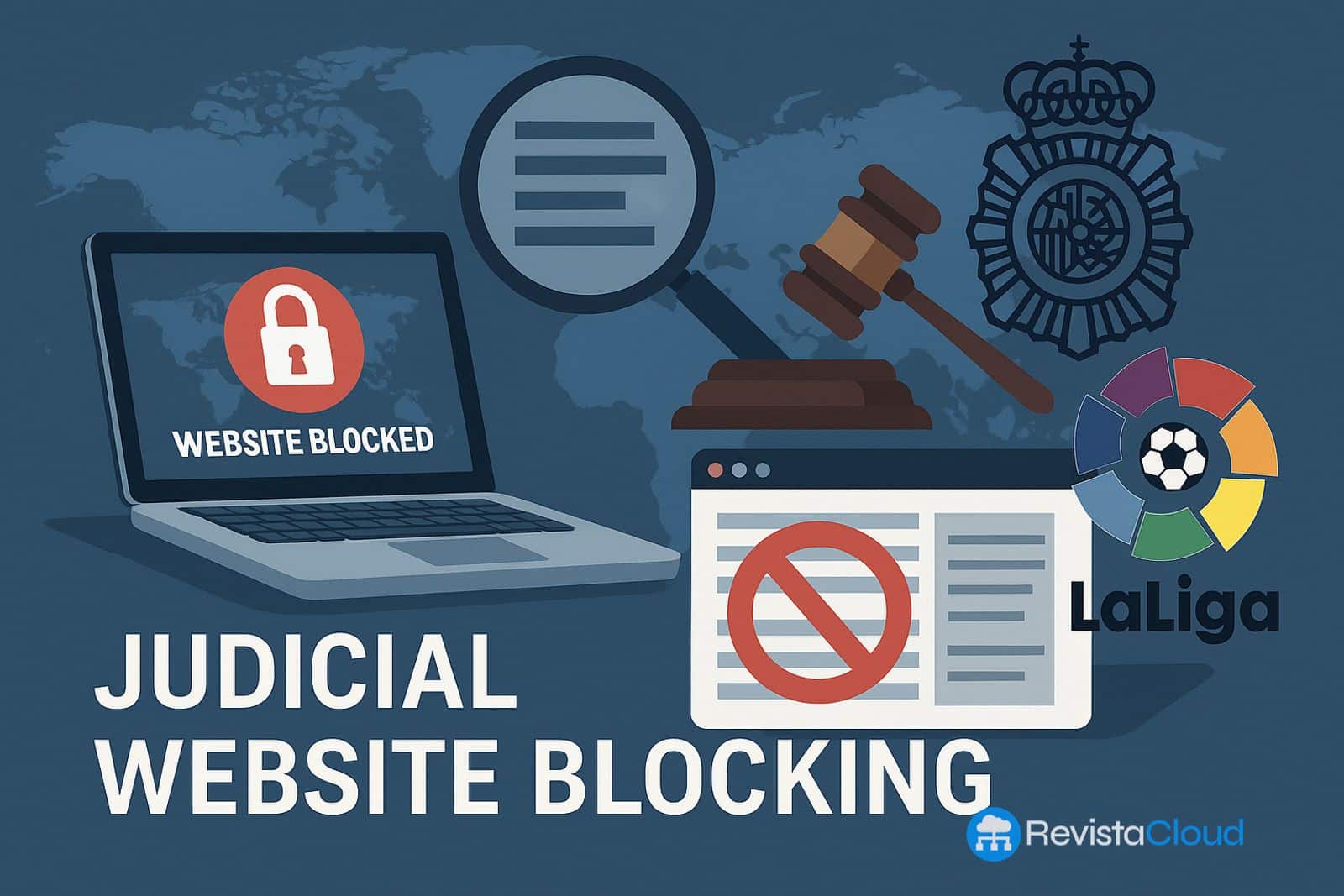Even MARCA has reported it. The sports newspaper published that the mass blocking of Cloudflare IP addresses requested by LaLiga to combat illegal football streaming prevented access over the weekend to Blue Protocol: Star Resonance, a free-to-play managed by the publisher A Plus with protection from Cloudflare. The outage coincided with the start of the league matches on Saturday, October 18, leaving thousands of users unable to connect to the game’s servers.
This is not an isolated incident: weeks ago, Steam also experienced issues due to the same mechanism. Every weekend, social media testimonies appear from small businesses, media outlets, and individuals who find legitimate services inaccessible when the blocks happen.
What happened (and why it keeps happening)
- Who: LaLiga issues court orders against piracy; operators block IP ranges associated with Cloudflare, a CDN serving millions of websites and apps, including the affected video game.
- What: players of Blue Protocol couldn’t log in or maintain connection with the servers.
- When: weekend of October 18 (match day start).
- Why now: the game was launched on October 9; with increased traffic, it likely caught the attention of monitoring systems used to block illegal streams.

The core issue is structural: today’s Internet relies on shared infrastructure (CDNs, anycast, multi-tenant IPs). The same IP serves many services. If blocking is done by IP instead of by content, everything linked to that IP gets shut down, whether related to piracy or not.
Why this matters beyond football
- Users: weekends are peak gaming times; outages frustrate the community and erode trust.
- Business model: in a free-to-play game, downtime means fewer microtransactions and worse retention.
- Digital ecosystem: each incident punishes innocent parties and normalizes an ineffective and disproportionate blocking approach for a multi-tenant Internet.
What players are saying and what industry can learn
Complaints have surged on X and Reddit: “won’t connect,” “servers down,” “only happens at league start.” The technical takeaway is clear:
- Blocking by IP is a “hammer” in a world that needs scalpel.
- The CDN-driven approach makes IP ≠ service; blocking IPs of a provider impacts third-party services as well.
- Widespread weekend bans and broad blocking windows maximize collateral damage.
Can piracy be tackled without breaking everything else?
Yes, but it requires precise technical and legal adjustments:
- More granular measures: prioritize blocking by domain/URL/DNS or content fingerprinting, instead of whole IP ranges.
- Versioned and traceable lists: operators and CDNs maintain auditable records of blockages, including timing and reasons.
- Reassessment windows: orders with clear deadlines, proportionality controls, and periodic reviews.
- Swift unblock procedures: appeal channels for affected services and SLA for remediation (minutes/hours, not days).
- Coordination: rights holders, operators, and CDNs with 24/7 channels when blocks impact legitimate services.
What the involved parties can do now
- Rights holders (LaLiga and partners)
- Demand minimum impact criteria and damage metrics to third parties in directives.
- Request post-action reports: what was blocked, for how long, and who was affected.
- CDNs and game publishers
- Segment critical services onto alternative IPs/ASNs when possible.
- Establish emergency contacts with operators to resolve false positives swiftly.
- Network operators
- Implement blocks with control plans and finer lists, avoiding long-term shared IP bans.
- Publish procedure for de-banning for third parties.
- Regulators/judges
- Embed proportionality and remediation into resolutions.
- Ensure independent oversight and transparency in measures.
Summary
- Protecting rights is essential, but IP blocking in a shared Internet causes recurring collateral damage.
- The Blue Protocol case — like Steam before it — shows that current methods break innocent services and punish the wrong users.
- The way forward involves more precise blocking, transparency, quick unblocking for third parties, and better coordination among stakeholders.
That MARCA highlights this is a sign: the debate is no longer purely technical. It affects millions of people and threatens the health of the digital ecosystem. It’s time to fix the tool before the next weekend.
Article available at marca.com and seen on bandaancha.eu

